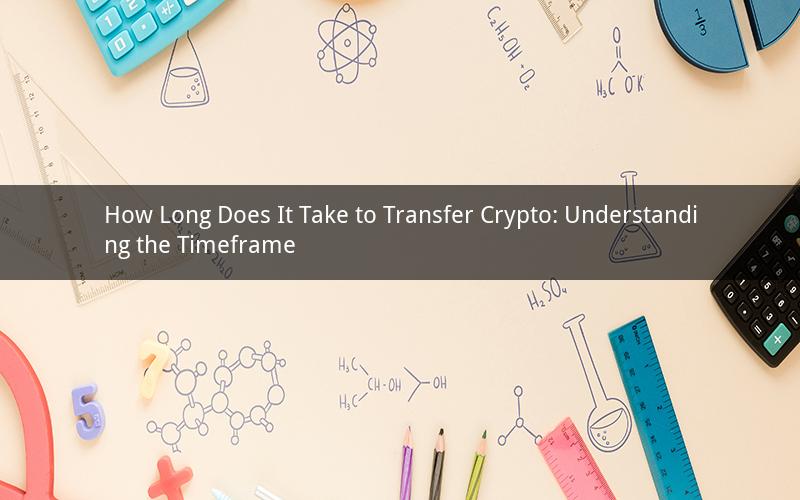
In the world of cryptocurrencies, transferring funds from one wallet to another is a fundamental operation. However, many users often wonder about the duration it takes for a crypto transfer to be completed. This article delves into the factors influencing the transfer time and provides insights into the average duration for different types of crypto transactions.
Factors Influencing Transfer Time
1. Blockchain Network Congestion
The congestion level of a blockchain network plays a significant role in determining the transfer time. When the network is experiencing high activity, such as during market volatility or major events, transaction confirmations may take longer. This is because the network's capacity to process transactions is limited.
2. Transaction Fee
The transaction fee is another crucial factor. It incentivizes miners to include your transaction in the next block. Higher fees encourage miners to prioritize your transaction, resulting in faster confirmation times. Conversely, lower fees may lead to longer wait times as your transaction is included in a block with other transactions.
3. Blockchain Technology
Different cryptocurrencies operate on different blockchain technologies, which can affect transfer times. For instance, Ethereum (ETH) uses a Proof of Work (PoW) consensus mechanism, while Bitcoin (BTC) operates on a similar mechanism. Additionally, newer blockchain technologies like Proof of Stake (PoS) can offer faster transaction speeds.
4. Wallet Type
The type of wallet you are using can also impact transfer times. Exchanges and online wallets generally offer faster transfer speeds compared to hardware wallets. This is because online wallets are directly connected to the blockchain network, whereas hardware wallets require manual input or synchronization with a computer.
Average Transfer Time for Different Cryptocurrencies
1. Bitcoin (BTC)
Bitcoin transfers can take anywhere from 10 to 60 minutes, depending on network congestion and transaction fees. During peak times, it may take longer, up to an hour or more.
2. Ethereum (ETH)
Ethereum transfers are generally faster than Bitcoin, with an average confirmation time of 1 to 3 minutes. However, during high network congestion, it can take up to 15 minutes or more.
3. Litecoin (LTC)
Litecoin transfers are known for their speed, with an average confirmation time of around 2.5 minutes. However, during high network congestion, it may take slightly longer.
4. Ripple (XRP)
Ripple transfers are extremely fast, with an average confirmation time of a few seconds. This is due to Ripple's unique consensus algorithm, which allows for near-instantaneous transactions.
5. Cardano (ADA)
Cardano transfers can take anywhere from 20 to 60 seconds, depending on network congestion and transaction fees. During peak times, it may take slightly longer.
Frequently Asked Questions (FAQs)
1. Question: Why is my crypto transfer taking so long?
Answer: There could be several reasons, including high network congestion, low transaction fees, or issues with your wallet or network connection.
2. Question: Can I speed up my crypto transfer?
Answer: Yes, you can speed up your transfer by increasing your transaction fee. This incentivizes miners to prioritize your transaction.
3. Question: Why are my crypto transfers taking longer than usual?
Answer: This could be due to a temporary increase in network congestion, such as during market volatility or major events.
4. Question: How can I check the status of my crypto transfer?
Answer: You can check the status of your transfer by using a blockchain explorer or by contacting the wallet or exchange you are using.
5. Question: Can I cancel a crypto transfer?
Answer: Once a transaction is broadcast to the blockchain, it cannot be canceled. However, if you have not yet received a confirmation, you may be able to cancel the transaction by contacting the wallet or exchange you are using.
In conclusion, the duration of a crypto transfer depends on various factors, including network congestion, transaction fees, blockchain technology, and wallet type. By understanding these factors, you can better estimate the time it will take for your crypto transfer to be completed.